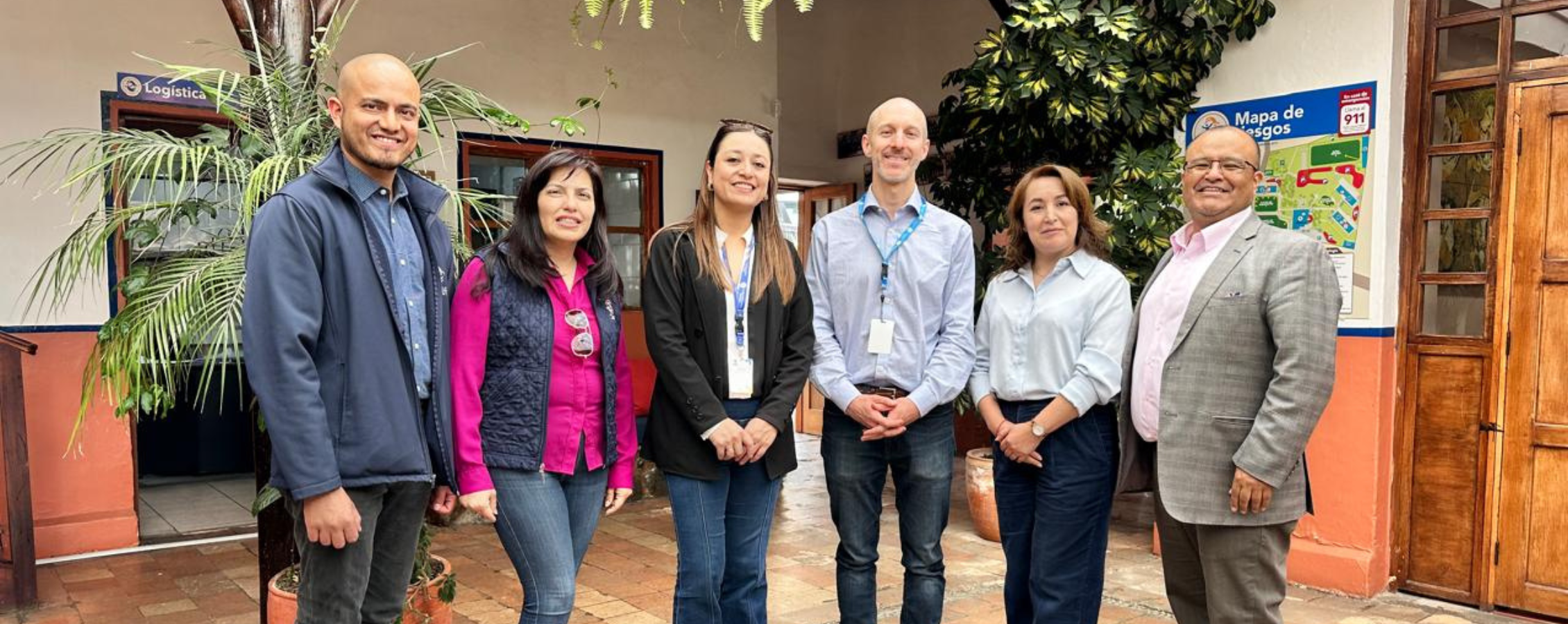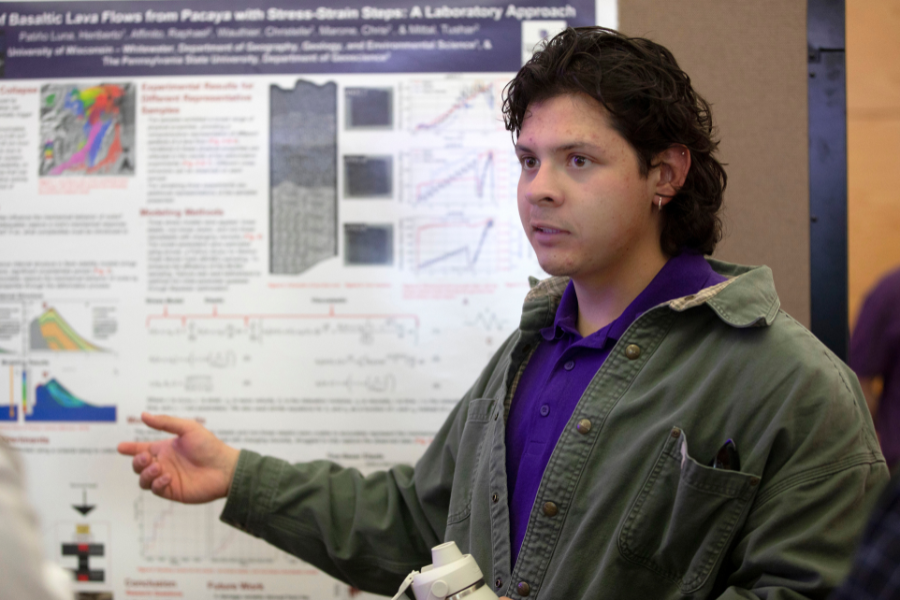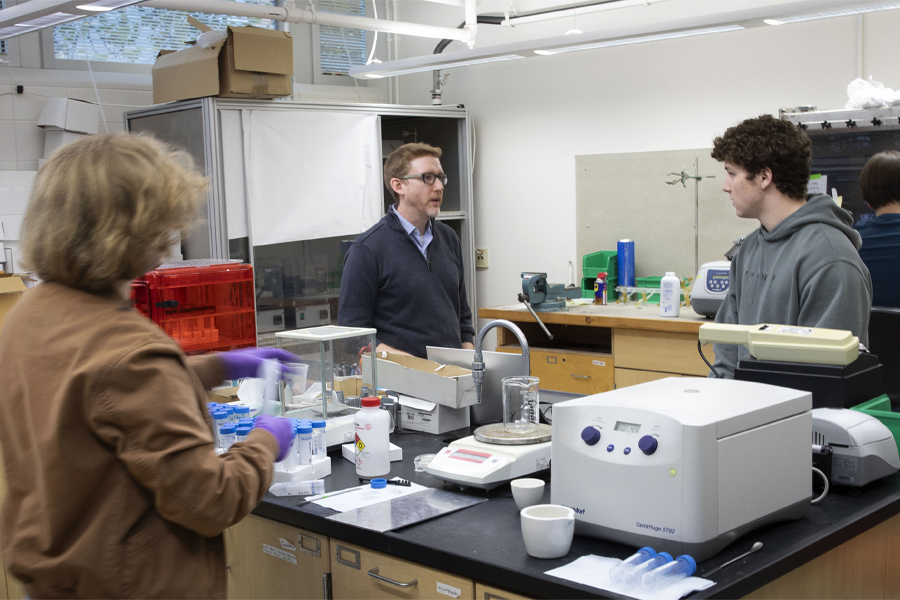UW-Whitewater faculty named Fulbright Scholars in Colombia, Belize
September 18, 2025
Written by Chris Lindeke and Kristine Zaballos | Photos by Craig Schreiner
Two members of the faculty at the University of Wisconsin-Whitewater further burnished the university’s reputation for great teaching by being named Fulbright Scholars.
Andrew Hurie, an assistant professor of curriculum and instruction who teaches bilingual education and English as a second language (ESL), was awarded a Fulbright to teach and conduct research in Colombia during the 2024-25 academic year. Stephen Levas, an associate professor of biology and geography, geology and environmental science, will teach and conduct research in Belize during the 2025-26 academic year.
“We are so proud to see these faculty members being rewarded for their commitment to research and teaching,” said Robin Fox, interim provost and vice chancellor of academic affairs. “It’s this commitment that consistently has UW-Whitewater lauded as a College of Distinction, and it’s the kind of experience — exemplified by our Great Teaching stories — that makes a difference to our students every day.
The Fulbright Program is the U.S. government's flagship international educational and cultural exchange program, providing about 8,000 competitive, merit-based grants to U.S. citizens to study, research, or teach abroad and to foreign nationals to study or teach in the U.S. every year.
While Hurie and Levas are in different colleges — the College of Education and Professional Studies and the College of Letters and Sciences, respectively — they share a passion for ongoing learning that will ultimately benefit the students in their classrooms.
Professor of bilingual education and ESL taught in Colombia
Andrew Hurie, an assistant professor of curriculum and instruction who specializes in bilingual education and ESL, was in his third year of teaching at UW-Whitewater when he learned he would be shifting his focus to the University of Nariño in Pasto, Colombia. Born in Madison, he has a longtime connection to Pasto, where his wife and son were born.
In addition to teaching a series of research workshops at the university in Pasto and traveling to Ecuador to give a talk on teaching English at the University of Cuenca, Hurie worked with Los Ángeles Children’s Hospital in Pasto and UNIPA, or Unidad Indígena del Pueblo Awá, a political organization by and for the Awá people living in 32 Indigenous reservations across Nariño, Colombia.

Andrew Hurie speaking at the University of Cuenca in Cuenca, Ecuador, about "Teaching English in a Multipolar World" in April 2025. (Submitted photo)
With UNIPA’s support, Hurie conducted dozens of interviews at the children’s hospital in Pasto, half in Awapit, the language of the Awá people, with an interpreter, and the rest in Spanish. The idea to do so stemmed from pediatric doctors at the hospital, who wanted to offer services more aligned to the 30% of patients who identify as Indigenous, the largest percentage being Awá.
In the interviews he asked Awá families how they conceived of health and well-being.
“These mothers, fathers, aunts, and grandparents from 10 different Indigenous reservations in Nariño, expressed an expansive understanding of community health centered on collective self-determination and caring for the land, which contrasts with the individual and mechanistic frame that dominates Eurowestern medicine,” said Hurie. “The families also valued diverse healing traditions and reported receiving good care at the hospital, yet leaving their rural homes to seek care in the city was a jarring experience for many. Feeling listened to made a great difference in their well-being.”
Some of the changes in practice suggested by the interviews include providing access to traditional foods not grown with pesticides and allowing multiple family members to visit children at the same time.
Since returning from Colombia in August, Hurie continues to meet with representatives from UNIPA and the hospital, and share the research results with different audiences.

Andrew Hurie speaking at the University of Nariño in Pasto, Colombia. (Submitted photo)
“I see my role as coordinating conversations and uplifting the voices of the families. The hospital didn’t have the time to do the interviews. It was helpful to have a researcher and educator like me to facilitate the conversations, because it hadn’t happened before.”
“The Fulbright Scholarship really brings home the fact that local connections and international connections are both meaningful,” said Hurie. “Recognizing Indigenous people who have been and continue to steward the land, and their ongoing, shared struggles throughout the globe, reinforce the value of international education experiences — something I hope to bring back to the classroom at UW-Whitewater.”
Biology and geography professor to teach in Belize
Stephen Levas, associate professor of biology and geography, geology, and environmental science, will teach and conduct coral reef research in the Central American country of Belize in January through May 2026.
Levas will be teaching a coral reef ecology class and embedding his research to get the students to work with a large data set from a coral reef station that measures several different metrics. He has already started working with some of them, including one person working on their master’s defense.
“It’s a way to build relationships — that’s one of the fundamental reasons I applied,” Levas said. “When you hear the name ‘Fulbright,’ for me, it means a high level of success. It’s pretty prestigious in the academic realm. I was interested in building something between UW-Whitewater and other places where we don’t already exist.”

Steven Levas, left an associate professor of geography, geology, environmental science and biology, during class with students in a summer STEM Boot Camp program at UW-Whitewater.
A father of two sons, Levas is also excited to experience Belize with his family present.
“This could be a really great experience for them to live outside of their comfort zone,” he said.
Levas identified Belize based on his interests in environmental science, ecosystems, and the natural world. His current research focuses on both seawater chemistry and freshwater ecosystems. He has conducted coral reef research in Australia, Mexico and Hawaii over the past two decades.
Levas’s interest in looking at the changes in coral reefs over the last 20 years is only exceeded by his passion for working with students interested in the marine biology field.
“What’s more important, beyond the research, is that experience of mentoring students and getting the next cohort of marine biologists in Belize going,” he said. “I truly believe in education, I believe in mentorship because I am a product of all of that, and I know it works, and I want to do that for students at the University of Belize.”

Stephen Levas, far left, with a faculty-led travel study group at San Blas Islands, Panama, in 2024. (Submitted photo)
Levas, who joined the Warhawk family in 2016, said there are parallels between his work as a Fulbright Scholar and the work he does with UW-Whitewater students through undergraduate research. It’s that kind of work with the students — and the atmosphere of the campus community — that have kept him in Whitewater for nearly a decade.
“It’s the students, it’s the faculty, it’s the administrators who believe in Whitewater and what we do,” Levas said. “I have never been to a place where the faculty believe in the mission and what we do, which is getting students ready for the next step and help them get to wherever they want to be. The students understand why they’re here, they get why they’re here, and they believe in what we are trying to do.”




